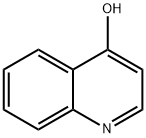Product Description
4-羟基喹啉/ 4-HYDROXYQUINOLINE
|
中文名称 |
4-羟基喹啉 |
|
英文名称 Product Name |
4-HYDROXYQUINOLINE |
|
中文别名 |
4-喹啉醇 |
|
化学名 Chemical Name |
4-Hydroxyquinoline |
|
CAS |
611-36-9 |
|
分子式 Molecular Formula |
C9H7NO |
|
分子量 Molecular Weight |
145.16 |
|
结构式 Structural Formula |
|
|
质量标准 Specifications |
98.0%,99.0% In-house |
|
包装规格 Packing Size |
|
|
用途 Usage |
作为精细化工或医药的中间体 A useful intermediate for the preparation of pharmaceutical actives and fine chemicals. |
Related products
Message



